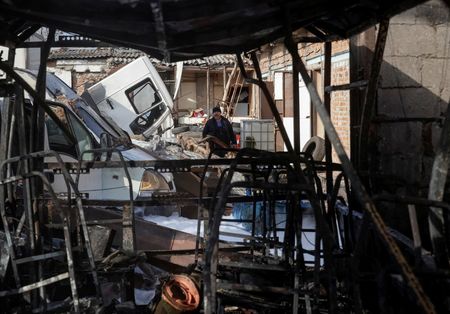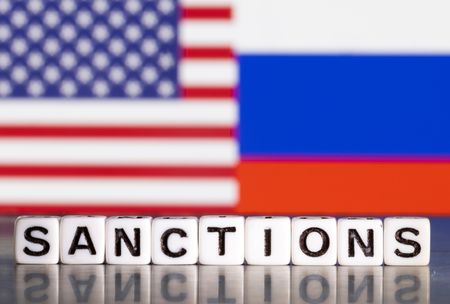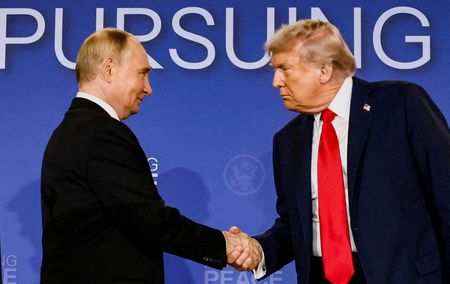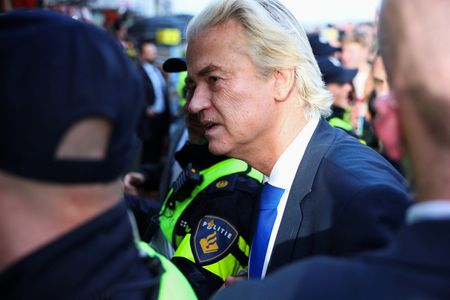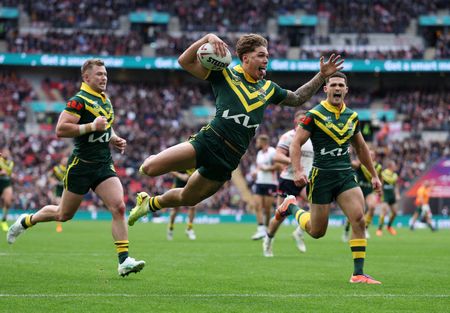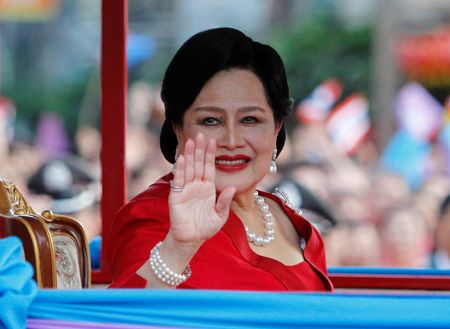By Gram Slattery, Max Hunder and Steve Holland
WASHINGTON (Reuters) -U.S. President Donald Trump’s administration has prepared additional sanctions it could use to target key areas of Russia’s economy if President Vladimir Putin continues to delay ending Moscow’s war in Ukraine, according to a U.S. official and another person familiar with the matter.
U.S. officials have also told European counterparts that they support the EU using frozen Russian assets to buy U.S. weapons for Kyiv, and Washington has held nascent internal conversations about leveraging Russian assets held in the U.S. to support Ukraine’s war effort, two U.S. officials said.
While it is not clear whether Washington will actually carry out any of those moves in the immediate term, it shows there is a well-developed toolkit within the administration to up the ante further after Trump imposed sanctions on Russia on Wednesday for the first time since returning to office in January.
Trump has positioned himself as a global peacemaker, but has admitted that trying to end Russia’s more-than-three-year war in neighboring Ukraine has proven harder than he had anticipated.
His meeting with Putin in Alaska in August failed to make progress. Trump told reporters in Doha on Saturday that he would not meet with Putin again unless a peace deal appeared likely. “I’m not going to be wasting my time,” Trump said.
European allies — buffeted by Trump’s swings between accommodation and anger toward Putin — hope he keeps increasing pressure on Moscow.
One senior U.S. official told Reuters that he would like to see European nations make the next big Russia move, which could be additional sanctions or tariffs. A separate source with knowledge of internal administration dynamics said Trump was likely to hit pause for a few weeks and gauge Russia’s reaction to Wednesday’s sanctions announcement.
Those sanctions took aim at oil companies Lukoil and Rosneft. The moves spiked oil prices by more than $2 and sent major Chinese and Indian buyers of Russian crude looking for alternatives.
Trump said on Saturday that when he meets with President Xi Jinping on Thursday, China’s purchases of Russian oil may be discussed. But China is cutting back “very substantially” on Russian oil and “India is cutting back completely,” Trump told reporters.
BANKING SECTOR, OIL INFRASTRUCTURE
Some of the additional sanctions prepared by the United States target Russia’s banking sector and the infrastructure used to get oil to market, said a U.S. official and another person familiar with the matter.
Last week, Ukrainian officials proposed new sanctions that the U.S. could levy, said one source with knowledge of those conversations. Their ideas included measures to cut off all Russian banks from the dollar-based system with U.S. counterparts, two sources said. It is not clear, however, whether Ukraine’s specific requests are being seriously considered by U.S. officials.
Some U.S. senators are renewing a push to get a long-stalled bipartisan sanctions bill over the line. The person with knowledge of internal administration dynamics said Trump is open to endorsing the package. The source warned, though, that such an endorsement is unlikely this month.
The Treasury Department did not respond to a request for comment.
Kirill Dmitriev, Russian President Vladimir Putin’s special envoy for investment and economic cooperation, said on Friday he believes his country, the United States and Ukraine are close to a diplomatic solution to end Russia’s war in Ukraine.
Halyna Yusypiuk, Ukrainian Embassy spokesperson in Washington, said the recent sanctions decision was appreciated, but did not otherwise comment.
“Dismantling Russia’s war machine is the most humane way to bring this war to an end,” Yusypiuk wrote in an email.
A WEEK OF WHIPLASH
Trump’s decision to hit Russia with sanctions capped a tumultuous week with respect to the administration’s Ukraine policy.
Trump spoke with Putin last week and then announced the pair planned to meet in Budapest, catching Ukraine off guard.
A day later Trump met with Ukrainian President Volodymyr Zelenskiy in Washington, where U.S. officials pressed Zelenskiy to give up territory in the Donbas region as part of a lopsided land swap to end the war. Zelenskiy pushed back, and Trump left the meeting with the position that the conflict should be frozen at its frontlines.
Then last weekend Russia sent a diplomatic note to Washington reiterating previous peace terms. A few days later Trump told reporters the planned meeting with Putin was off because “it just didn’t feel right to me.”
Speaking to CNN on Friday after arriving in Washington for talks with U.S. officials, Dmitriev said a meeting between Trump and Putin had not been cancelled, as the U.S. president described it, and that the two leaders will likely meet at a later date.
Two U.S. officials argued privately that, in hindsight, Trump’s abortive plan to meet with Putin was likely the fruit of irrational exuberance. After sealing a ceasefire in Gaza, those officials said, Trump overestimated the degree he could use momentum from one diplomatic success to broker another one.
Trump ultimately decided to slap Russia with sanctions during a Wednesday meeting with Treasury Secretary Scott Bessent and Secretary of State Marco Rubio, a senior White House official said.
(Reporting by Gram Slattery and Steve Holland in Washington and Max Hunder in Kyiv; Additional reporting by Humeyra Pamuk, Jonathan Landay, Daphne Psaledakis, Timothy Gardner in Washington and Julia Payne in Brussels; Editing by Michelle Nichols, Sergio Non and Diane Craft)

